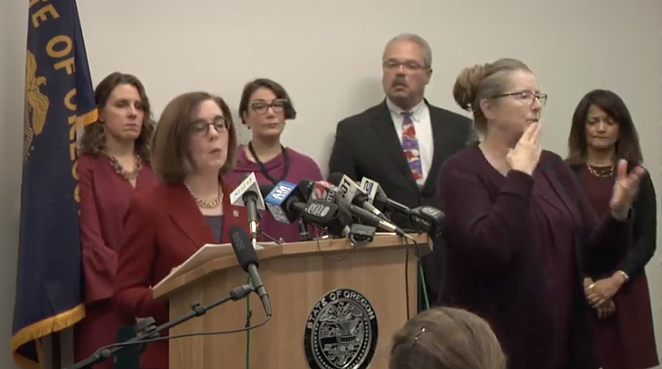She based these on recommendations from the Centers for Disease Control and Prevention, public health experts in the state, epidemiologists and other health professionals.
As of Thursday, there are 24 confirmed cases in Oregon across eight counties, including one local case in Deschutes County. More than 20 people in the U.S. have died from the virus and most of these cases have been in Washington State.Health officials said they've estimated that as many as 75,000 Oregonians could be infected with COVID-19 by mid-May, if steps such as social distancing are not taken right now in the state.
tweet this
At a press conference this morning, health officials said they've estimated that as many as 75,000 Oregonians could be infected with COVID-19 by mid-May, if steps such as social distancing are not taken right now in the state.

Brown's strategies to slow the spread of coronavirus include:
Large Gatherings:
Banning all large gatherings over 250 people, effective for four weeks, through April 8. This is defined as all events where a minimum of 3 feet cannot be maintained and includes weddings and religious services.
Schools:
Until further notice, the governor recommends that all schools and colleges remain open if there have been no cases of COVID-19 on campus. Cancel all non-essential school gatherings and group activities.
UPDATE 3/12 12:47pm: Bend-La Pine Schools issued a statement this afternoon, saying all non-essential gatherings, including athletic matches, performances and field trips are canceled across the district for the next 30 days. Students can still attend practices. In addition, groups using school facilities are not allowed to use the facilities for the next 30 days. The change is effective as of today (Thursday).
Workplace:
Brown recommends distancing measures: Increase physical space between employees within office spaces and worksites, limit in-person meetings, limit travel, stagger work schedules if possible.
Assisted Living and Long-Term Care Facilities:
Restricted and screened visitation, limited outings. The Oregon Department of Human Services launched an illness-prevention review program yesterday. A team of more than 70 people will review 670 facilities across the state.
“Nobody is immune to this virus, it can touch everyone," Brown said yesterday. “We can't let fear and anxiety stigmatize people. We are seeing cases across multiple counties and age groups, and in people exposed through different circumstances. It's time for us all to do what we can to slow its spread and take care of one another."
Brown sent an updated request to Vice President Mike Pence yesterday outlining Oregon’s needs from the federal government which includes:
Additional Testing Kits
Request for Personal Protective Equipment:
Includes 600,000 surgical or procedural masks, 400,000 N-95 respirators, gowns and gloves, face shields or goggles, Tyvek suites, ambulance protection systems and ventilators
Expedited Federal Funding:
Oregon is expecting to receive $7.8 million in emergency CDC grant funding, and Brown wants it as soon as possible
Access to Meals for Students and Families:
Funding for meals in the event of school closures
Flexibility in Administering Social and Health Services
In total there are 38 items Brown has listed, ranging from online learning options, economic stimulus, passing a national paid sick-leave law and increasing unemployment insurance.
State Health Officials' Announcements Thursday Morning
Thursday morning, Brown held a press conference at the Portland State Office Building. She was joined by Oregon Health Authority Director Patrick Allen, Multnomah County Chair Deborah Kafoury, Portland Mayor Ted Wheeler, Tri-County health officials from the Portland area and other state and local officials.
Brown emphasized that this is an unprecedented health crisis that most Oregonians have never experienced in their lifetimes, and that the state is taking immediate action. The strategy right now involves slowing the transmission, and preserving the capacity for hospitals to serve those who need it most. Brown said her number-one goal is to protect Oregonians, and second, to secure jobs and the economy. Because she expects the outbreak will impact our daily lives and the economy, the State has a plan for how “businesses, especially small businesses will ride this out,” Brown said.
Portland Mayor Ted Wheeler declared a State of Emergency on behalf of the City of Portland which “gives the City additional authority to properly address the threat of infection and harm,” he said. Wheeler said the Water Bureau will not disconnect anyone’s access to the residential water supply if they are not able to pay for it, and the City has installed additional portable toilets with hand-washing stations throughout the city. In addition, Portland will keep winter warming shelters open for more time and give out motel vouchers to those who need it.
(Anne Aurand, Communications Director for the City of Bend, said yesterday that the City will post an emergency banner on its website and push information out through media channels if they shut down City Hall or other public services.)
Other speakers at the press conference this morning included Dr. Dean Sidelinger with the OHA, who said there could currently be between 150 to 250 novel coronavirus cases in the state, based on estimates from Washington State, and that the number of cases there has doubled every week. Sidelinger said he’s consulted with TriMet, Portland’s transit system, to increase cleaning and distancing measures on public transit, though it will continue to run until further notice.The Source is maintaining an active, growing list of event cancellations in Central Oregon. Check out our event cancellations in Central Oregon page, and email [email protected] with updated event information.
tweet this
Sidelinger said the state’s capacity for testing is still at 80 people per day though the OHA is working with labs at Oregon State University to increase capacity as soon as possible. He emphasized that the State is not expanding testing because it wants to have the capacity to test the most vulnerable groups first. Both Sidelinger and Brown expressed the desire to have more capacity to test, but said that the federal government alone has the authority to expand testing.
OHA Director Patrick Allen said that there are global shortages for hand sanitizer and other materials because many of these items are manufactured in China, the Chinese have been using them themselves. The State has been able to access some of the national stockpile of supplies, but the shortages may become worse, Allen said.
The Source is maintaining an active, growing list of event cancellations in Central Oregon. Check out our event cancellations in Central Oregon page, and email [email protected] with updated event information.























